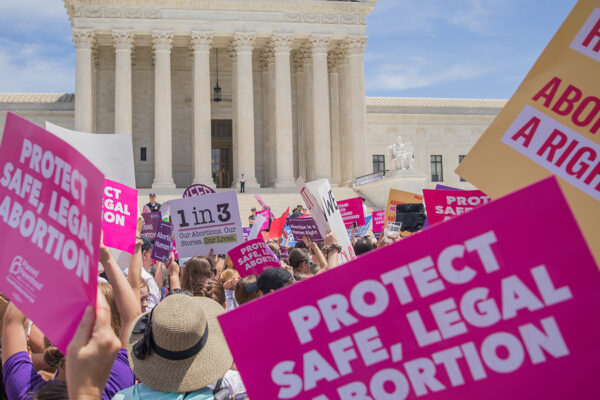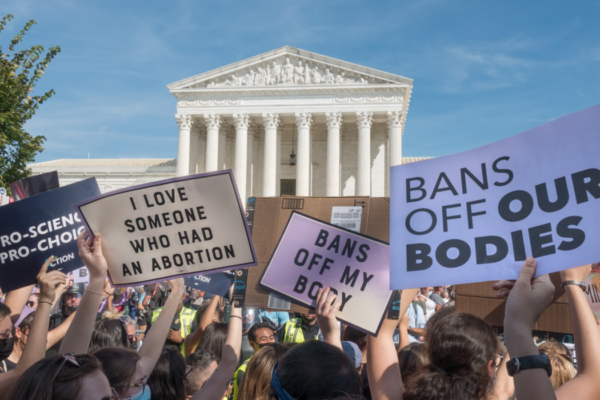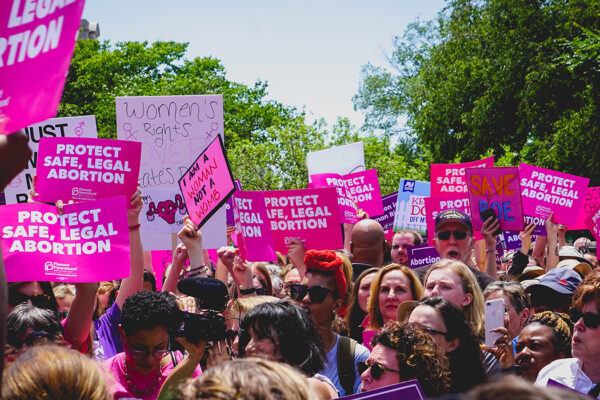The debate over abortion has only intensified in the wake of the U.S. Supreme Court’s Dobbs v. Jackson ruling, which overturned Roe v. Wade and stripped away constitutional protections for abortion, returning the issue to states. Since the ruling, 12 states have banned or severely restricted abortion care, and at least 10 other states have bans pending or on hold.
In response, the Office of the Provost at Washington University in St. Louis is offering a new interdisciplinary course this fall that aims to provide students with a nuanced understanding of what led to the ruling and implications as the nation moves forward in a post-Roe world.

Over the course of the semester, students in the 1.5 credit hour “Politics of Reproduction” course (I50 INTER D 310) will explore topics including reproductive health, law, disability, economics, film, politics, reproductive justice and religion through a series of in-person events and public webinars featuring leading scholars from almost every school as well as guest speakers. There also will be options to complete work asynchronously.
In designing the course, Rebecca Wanzo, professor and chair of the Department of Women, Gender, and Sexuality Studies in Arts & Sciences, said she wanted to create a course that appealed to students from every discipline and provided them with a variety of different knowledge bases they need to think about this issue more holistically.
“I want people to recognize how the debates around abortion touch pretty much every aspect of life, and that’s one of the things that interdisciplinary thinking helps you do,” Wanzo said.
“We are fortunate to have some leading authorities around these issues on campus, scholars such as Marie Griffith, author of the book ‘Moral Combat;’ Susan Appleton, a nationally recognized expert in family law and feminist legal theory; and Zakiya Luna, an influential reproductive justice thought leader.”
The course launched in July with a public event in which Tessa Madden, MD, and Dineo Khabele, MD, from the School of Medicine discussed what reproductive health looks like post-Dobbs. The event was recorded for students to watch asynchronously. Among additional speakers are:
- Anca Parvulescu, Rachel Brown and Shanti Parikh, in Arts & Sciences, and Mytheli Sreenivas, at Ohio State University, on abortion rights in other countries;
- Jessica Levy, at the Brown School, on public health, maternity and poverty; and
- Diana O’Brien, in Arts & Sciences, on legislative politics and abortion.
Bringing together these diverse, internationally renowned scholars in one course is a unique opportunity for students.
“‘Politics of Reproduction’ is meant to be an exploratory course that gives people time to think through issues in a way that might be challenging for them or out of their comfort zone.”
Rebecca Wanzo
“‘Politics of Reproduction’ is meant to be an exploratory course that gives people time to think through issues in a way that might be challenging for them or out of their comfort zone,” Wanzo said.
Rather than shying away from sensitive topics, Wanzo said the class will address them head on, building on a variety of research and scholarship from economists to religious and legal scholars, philosophers and more. People from all political perspectives are welcome to take the course; however, all students are expected to engage in respectful conversation around these issues, just as they do in other classes.
“Because that’s what we do, as members of the university community. We model better forms of debate and conversation than perhaps we see elsewhere in our culture,” Wanzo said.
During the final session, faculty members from the Sam Fox School of Design & Visual Arts and the McKelvey School of Engineering will lead students in a workshop where they will think about what they want reproductive futures to look like for themselves and the broader world.
‘In St. Louis, for St. Louis’ and beyond
The “Politics of Reproduction’ course was inspired by another popular pop-up interdisciplinary course, “The Pandemic: Science and Society,” offered by Arts & Sciences during summer 2020. More than 1,200 students completed that online course. While this course will be smaller in scale — as this is taking place while students have other course options — it is still designed to give as many students as possible an opportunity to take the course, Wanzo said.
Many of the lectures this semester will be open and available to the public, allowing the university to share its knowledge and expertise with the community and to help advance discourse around the issues, Wanzo explained.
“In developing this course, we’re modeling what the future of academia can offer, where university communities come together across various disciplines to think through complicated issues — not just for its small, treasured community, but for society,” Wanzo said.
This course would not be possible without the support of the provost’s office and the faculty members, Wanzo said.
“Overwhelmingly, faculty members were happy to participate in this collaborative project, and I’m deeply grateful to them,” she added.
“A university has a responsibility to prepare students for citizenship, and to provide opportunities to think deeply about issues that matter. This course will give students a broader range of tools to discuss and understand one of the most pressing topics today.”



